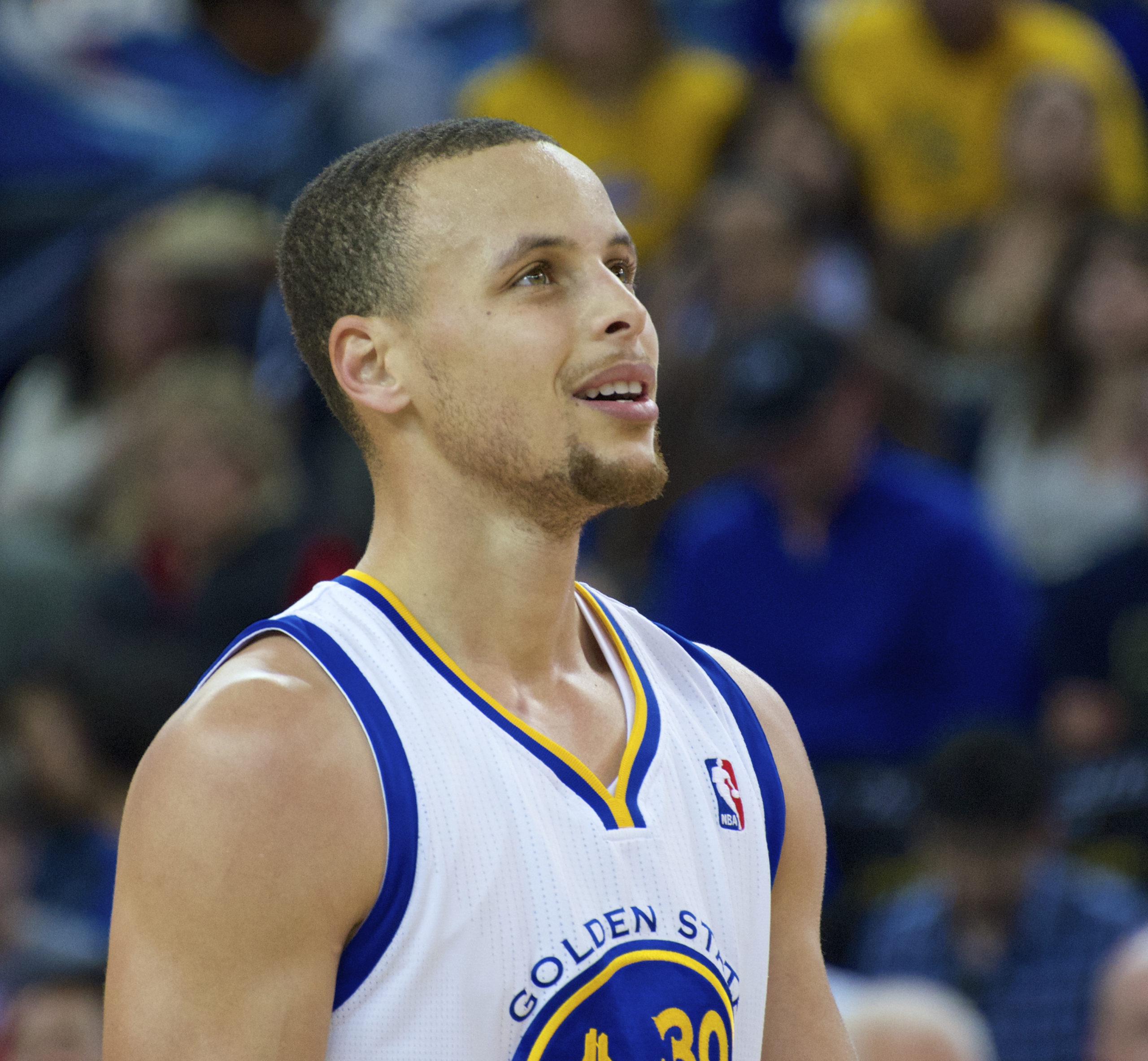
“I hope I inspire people all around the world to just be themselves, be humble and to be thankful for all the blessings in your life.”
Prior to the 2009 NBA draft, a draft report was released on Stephen (“Steph”) Curry.
Six foot, three inches, one hundred and eighty-five pounds. Position, Point Guard. Steph’s explosiveness and athleticism are sub-standard. He’s not a great finisher around the basket. He needs to significantly improve as a ball handler, often struggles against physical defenders. He needs to develop as a point guard to even make it in the league. He will have limited success at the next level. Do not rely on him to run your team.
Steph Curry has been dealing with criticism and doubters since he was a young boy. He was typically one of the smaller players on the basketball court. As a high school sophomore, he was 5 feet, 8 inches tall and weighed 125 pounds. He also lacked upper body strength and subsequently shot from the hip — so his shots often got blocked. However, his dad, Dell Curry, was a celebrated NBA player and decided to help his son. He totally revamped Steph’s shot during the off-season before Steph’s junior year. That basketball season Steph struggled mightily with these changes and certainly did not look like a big-time college prospect. However, the next year —his senior year — Steph averaged 24 points per game and led Charlotte Christian School to the state finals!
Despite living in the heart of the Atlantic Coast Conference (ACC), Steph never received a scholarship offer from any of its Division I colleges. Even Virginia Tech, his father’s alma mater, only offered Steph the opportunity to be a walk-on. Instead of sulking or giving up, Steph turned that rejection into an incentive to prove himself. “I used it as motivation that summer before my senior year to just play my game, knowing the right coach and the right college would come and make themselves known.” That right coach turned out to be Bob McKillop and the right college was Davidson, a small mid-major school just outside of his hometown of Charlotte, North Carolina.
Steph became an instant star in the Southern Conference, being named the conference freshman of the year and tournament MVP in his freshman and sophomore years. However, his coming out party occurred during his sophomore year at the NCAA tournament. Having won their conference championship, the Wildcats entered the 2008 tourney as a 13-seed. Their first-round opponent was Gonzaga, the 7-seed. Down 11 points early in the second half, Curry unleashed a 40-point barrage, including hitting 8 of 10 three-point shots for the come-from-behind victory. Next up was second-seeded Georgetown. Another 30 points for Steph and another upset for Davidson. In a sweet 16 matchup with number 3 seed Wisconsin, Steph scored 33 points en route to a blowout win. Kansas, the number 1 seed, was the only obstacle in their way of reaching the Final Four. Double-teamed most of the day, Steph managed to get 25 points in a narrow 57-59 loss to the eventual national champions.
Steph’s play electrified audiences, but NBA executives wondered about his ability to succeed at the next level. Despite being the leading scorer in all of college basketball his junior year, even he was unsure of his future. Fortunately, the Golden State Warriors, at that time a struggling franchise, believed in his abilities and selected him with the 7th pick in the 2009 draft. Finally, someone believed in his skills and his style of play.
To be honest, no one would have predicted the tremendous success that Steph has had in the NBA or the impact he has had on the game of basketball. In a game that was once dominated by the big-guy inside or the athletic guy who could drive to the hoop, Steph has changed the focus to the perimeter. Steph’s coach, Steve Kerr, put Steph’s impact into perspective: “What Michael Jordan was to the dunk, and Magic Johnson was to the assist, Curry is to the 3-pointer.” When he is on the court, Steph has the green light to shoot any shot from anywhere. This is why he holds the record for the most 3-pointers taken and made in a single season. And, on December 14, 2021, Steph broke the all-time record of career 3-pointers with 2,974, which has quickly surpassed 3,000. There’s no telling what that number will be when he retires.
Prior to Steph Curry, the 3-pointer was a novelty — a weapon a team would use when the big guys couldn’t effectively score. After “The Steph Effect” and the 3-point revolution, teams were forced to focus on long-range shooters just to keep up. You see, it was just a matter of mathematics. If Steph makes 40% of his shots from beyond the 3-point line while other leading scorers shoot roughly 50% from the field, Steph has the advantage. His 3-point shots are worth 50% more than a 2-point shot. With this style of play, Steph led Golden State to 3 NBA championships and secured two league MVP titles.
To reach the pinnacle the way Steph has, it is important to appreciate his work ethic. He has an insatiable appetite to improve. His trainer, Eric Housen, creates legendary workouts that would make most sane humans quit. Housen says Steph practices “the difficult until it becomes normal… I can show the guy something brand-new and he will look like Bambi on the first three runs. And on the fourth or fifth run, he will look like he has been doing it all his life.” Even after winning his second league MVP, Curry brought his trainer a long list of goals to improve upon before the next season. Steph never rests on his laurels. He continually looks for flaws in his game and works hard to eradicate them.
On the court, Steph is referred to as the “Baby-Faced Assassin,” because of his boyish good looks and his ability to dominate a game. Off the court, he has a wholesome persona. Steph married his high school sweetheart whom he met in a bible class. Together they are raising three children. He is a devout Christian who lines up his priorities in a simple way — “God, Family.” Steph is never seen in a nightclub without his wife and he doesn’t employ an entourage to accompany him places. Instead, Steph spends his time having family barbecues, playing board games, and trying to be an actively involved dad. It is common to see one of his children on his lap when he gives a post-game interview.
All of this makes Steph very relatable. Parents love him because he is a positive role model. Corporations love him because of his squeaky-clean wholesome image. Young people love him because what he does seems so attainable. The previous generation wanted to “be like Mike (Jordan),” but not too many people are 6 feet 9 inches tall and possess the ability to take off from the free throw line and dunk the ball. Conversely, this generation wants to be like Steph. Perhaps that is because nearly everyone has attempted a 3-pointer and dreamed of hitting the winning shot from the top of the key. Kids marvel at his skills and think “maybe — if I work hard enough — that could be me.” Perhaps this also explains why Steph’s jersey regularly outsells all other jerseys in the NBA and why he is commonly the top vote-getter for the NBA all-star game.
Steph gives us all hope that we too can persevere over the obstacles we face in our daily lives the way he has in his life. After winning the league MVP Award, he left us with these words of inspiration:
It doesn’t matter where you come from, what you have or don’t have, what you lack or have too much of. All you need to have is faith in God, an undying passion for what you choose to do in this life, a relentless drive and the will to do whatever it takes to be successful.
Check out the Student Athlete ProgramStephen Curry is one of the 144 “Wednesday Role Models” featured in the Student Athlete Program. This program is designed to improve the character, leadership and sportsmanship of high school athletes. To learn more about this program and how you can implement it in your school:
